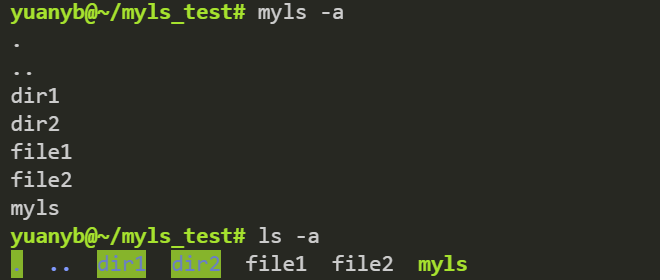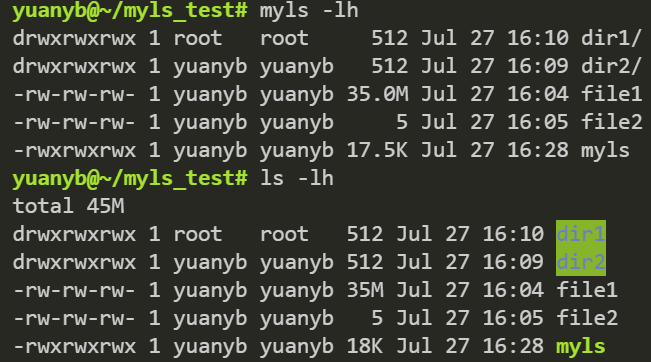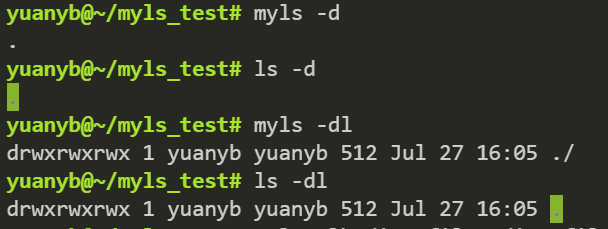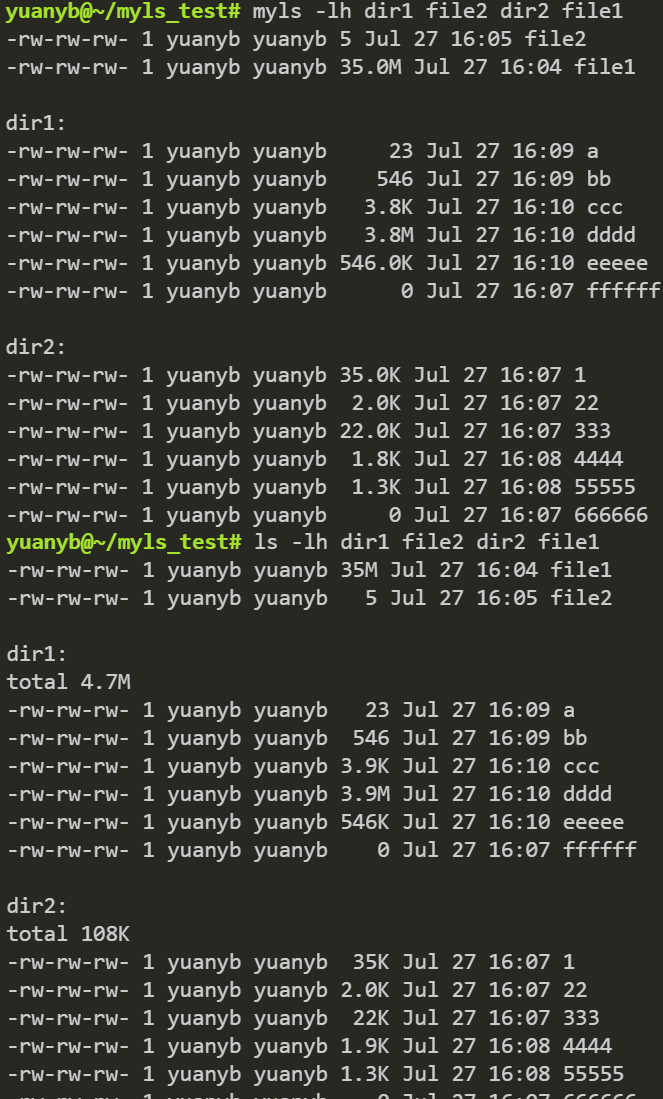Linux/UNIX编程:使用C语言实现简单的 ls 命令
2024-09-01 03:30:12
刚好把 Linux/UNIX 编程中的文件和IO部分学完了,就想编写个 ls 命令练习一下,本以为很简单,调用个 stat 就完事了,没想到前前后后弄了七八个小时,90%的时间都用在格式化(像 ls -l 中的对齐)输出了,反反复复改了好几遍。
一共实现了常用的四个选项:-a -h -l -d。可以从命令行参数中同时接受多个目录和文件,然后分开输出。
演示:
-a 命令:

-l 和 -h 命令:

-d 命令:

参数同时接受多个文件和目录名:

思路:
先使用 getopt 解析选项
然后判断参数有没有目录或文件(通过 operand 标志变量),没有的话仅输出进程当前目录
有的话将参数中的文件和目录分开(files 和 dirs数组),然后输出信息
因为要格式化输出,所以得将目录中所有项目读取完成后并转换成字符串形式(get_stat_str)才能获得长度最长的某个信息(如,文件名,尺寸),而目录中的文件数目又事先不可知,所以用链表结构(stat_str)将所有目录中所有文件的信息存储下来。
代码:
#include <stdio.h>
#include <stdlib.h>
#include <dirent.h>
#include <time.h>
#include <unistd.h>
#include <sys/stat.h>
#include <errno.h>
#include <string.h>
#include <limits.h>
#include <pwd.h>
#include <grp.h>
#define err_exit(func) {perror(func); exit(EXIT_FAILURE);} //打印出错函数,并结束程序
#define max(a, b) ((a) > (b) ? (a) : (b)) typedef struct stat_str{ //字符串形式的stat信息
char fname[NAME_MAX]; //大概长度,不严谨
char user[20];
char group[20];
char size[16];
char time[13];
char mode[11];
char nlink[5];
struct stat_str *next; //链表结构,因为需要预先获得目录里的所有项(为了控制格式化),但数目不确定,所以用链表保存
} st_str; int nlink_maxlen = 0, user_maxlen = 0, group_maxlen = 0, size_maxlen = 0; //字符串形式的最大长度,为了格式化构造字符串
int ARG_L = 0, ARG_A = 0, ARG_H = 0, ARG_D = 0; //参数是否定义 //解析选项
void analyse_opt(int argc, char* argv[]);
//将文件大小(字节数)转换成易读(human readable)的形式
void human_readable(off_t bytes, char *szbuf);
//构造文件的详细信息
void build_line(const st_str *stat_strbuf, char* fmtstrbuf);
//打印目录信息
void print_dir_info(const char *dir);
//获得文件信息的str形式
void get_stat_str(const struct stat* stbuf, const char* fname, st_str *strbuf); int main(int argc, char* argv[]) {
struct stat stbuf;
st_str st_strbuf;
int no_operand = 1; //是否没有操作数
analyse_opt(argc, argv); //解析选项 //分别获得目录和其他文件,为了格式化输出
char *files[argc-1], *dirs[argc-1];
int nf = 0, nd = 0;
for(int i = 1; i < argc; i++){
if(argv[i][0] == '-') //跳过选项
continue;
else
no_operand = 0;
if(-1 == lstat(argv[i], &stbuf))
err_exit("lstat");
if(S_ISDIR(stbuf.st_mode))
dirs[nd++] = argv[i];
else
files[nf++] = argv[i];
} if(no_operand){
//命令行没有输入路径
print_dir_info(".");
} else {
//先列出文件的信息
for(int i = 0; i < nf; i++){
char fmtstrbuf[256];
if(-1 == lstat(files[i], &stbuf))
err_exit("lstat");
get_stat_str(&stbuf, files[i], &st_strbuf);
if(ARG_L){
build_line(&st_strbuf, fmtstrbuf);
puts(fmtstrbuf);
} else {
puts(files[i]);
}
}
//再列出目录的信息
for(int i = 0; i < nd; i++){
if(nf > 0)
printf("\n%s:\n", dirs[i]);
print_dir_info(dirs[i]);
}
}
return 0;
} void analyse_opt(int argc, char* argv[]){
int opt;
while((opt = getopt(argc, argv, "lahd")) != -1){
switch (opt) {
case 'l':
ARG_L = 1;
break;
case 'a':
ARG_A = 1;
break;
case 'h':
ARG_H = 1;
break;
case 'd':
ARG_D = 1;
break;
}
}
} void human_readable(off_t nbytes, char *szbuf){
if(nbytes < 1024)
sprintf(szbuf, "%ld\0", nbytes);
else if(nbytes < 1024 * 1024)
sprintf(szbuf, "%.1lfK\0", (double)nbytes / 1024);
else if(nbytes < 1024 * 1024 * 1024)
sprintf(szbuf, "%.1lfM\0", (double)nbytes / 1024 / 1024);
else
sprintf(szbuf, "%.1lfG\0", (double)nbytes / 1024 / 1024 / 1024);
} void get_stat_str(const struct stat* stbuf, const char* fname, st_str *strbuf){
//mode
sprintf(strbuf->mode, "%c%c%c%c%c%c%c%c%c%c",
S_ISREG(stbuf->st_mode) ? '-' : (
S_ISDIR(stbuf->st_mode) ? 'd' : (
S_ISBLK(stbuf->st_mode) ? 'b' : (
S_ISCHR(stbuf->st_mode) ? 'c' : 'l'
)
)
),
(S_IRUSR & stbuf->st_mode ) ? 'r' : '-',
(S_IWUSR & stbuf->st_mode ) ? 'w' : '-',
(S_IXUSR & stbuf->st_mode ) ? 'x' : '-',
(S_IRGRP & stbuf->st_mode ) ? 'r' : '-',
(S_IWGRP & stbuf->st_mode ) ? 'w' : '-',
(S_IXGRP & stbuf->st_mode ) ? 'x' : '-',
(S_IROTH & stbuf->st_mode ) ? 'r' : '-',
(S_IWOTH & stbuf->st_mode ) ? 'w' : '-',
(S_IXOTH & stbuf->st_mode ) ? 'x' : '-' );
//nlink
sprintf(strbuf->nlink, "%ld\0", stbuf->st_nlink);
nlink_maxlen = max(nlink_maxlen, strlen(strbuf->nlink));
//user, group
sprintf(strbuf->user, "%s\0", getpwuid(stbuf->st_uid)->pw_name);
sprintf(strbuf->group, "%s\0", getgrgid(stbuf->st_gid)->gr_name);
user_maxlen = max(user_maxlen, strlen(strbuf->user));
group_maxlen = max(group_maxlen, strlen(strbuf->group));
//size
if(ARG_H){
char szbuf[16];
human_readable(stbuf->st_size, szbuf);
sprintf(strbuf->size, "%s\0", szbuf);
} else {
sprintf(strbuf->size, "%ld\0", stbuf->st_size);
}
size_maxlen = max(size_maxlen, strlen(strbuf->size));
//time
strftime(strbuf->time, 13, "%b %d %H:%M\0", localtime(&(stbuf->st_mtime)));
//fname
sprintf(strbuf->fname, "%s\0", fname); } void build_line(const st_str *stat_strbuf, char* fmtstrbuf){
char fmt[32];
sprintf(fmt, "%%s %%%ds %%-%ds %%-%ds %%%ds %%s %%s\0", nlink_maxlen, user_maxlen, group_maxlen, size_maxlen);
// puts(fmt);
if((stat_strbuf->mode)[0] == 'd')
strcat(stat_strbuf->fname, "/");
sprintf(fmtstrbuf, fmt, stat_strbuf->mode, stat_strbuf->nlink, stat_strbuf->user,
stat_strbuf->group, stat_strbuf->size, stat_strbuf->time, stat_strbuf->fname);
} void print_dir_info(const char *dir){
if(ARG_D){
//显式目录本身的信息
st_str stat_strbuf;
struct stat stbuf;
char fmtstrbuf[256];
if(-1 == lstat(dir, &stbuf))
err_exit("lstat");
get_stat_str(&stbuf, dir, &stat_strbuf);
if(ARG_L){
build_line(&stat_strbuf, fmtstrbuf);
puts(fmtstrbuf);
} else {
puts(stat_strbuf.fname);
}
} else {
group_maxlen = nlink_maxlen = user_maxlen = size_maxlen = 0;
//列出目录所有项
struct DIR *pdir = opendir(dir);
if(pdir == NULL)
err_exit("opendir");
struct dirent *pdirent;
struct stat stbuf;
st_str * head_st_str = (st_str*)(malloc(sizeof(st_str))), *p = head_st_str; //链表头(字符串形式的stat)
//循环都目录
errno = 0;
while((pdirent = readdir(pdir)) != NULL){
if((pdirent->d_name)[0] != '.' || ARG_A) {
//是否显示隐藏文件
if(ARG_L) {
char path[256];
strcpy(path, dir); //!!!!! 找了一个多小时才找出来这个错误
strcat(path, "/"); //!!!!! d_name仅是个文件名而已
strcat(path, pdirent->d_name); //!!!!! 需要加上完整路径
if(-1 == lstat(path, &stbuf)){
err_exit("lstat");
}
p->next = (st_str*)(malloc(sizeof(st_str)));
p = p->next;
p->next = NULL;
get_stat_str(&stbuf, pdirent->d_name, p);
} else {
puts(pdirent->d_name);
}
}
}
if(errno != 0)
err_exit("readdir"); //输出信息链表的格式化内容
p = head_st_str->next;
while(ARG_L && p){
char fmtstrbuf[256];
build_line(p, fmtstrbuf);
puts(fmtstrbuf);
p = p->next;
}
if(-1 == closedir(pdir))
err_exit("closedir");
st_str *q = head_st_str->next; //释放链表
while(q){
free(head_st_str);
head_st_str = q;
q = q->next;
}
free(head_st_str);
}
}
最新文章
- C#查看各种变量的指针地址
- 关于ASP.NET页面打印技术的总结【转】
- qq临时会话代码修改
- Kerberos的基本概念
- webform处理过程
- OpenCart本地调试环境搭建
- 《photoshop cc 新功能 生成图像资源》智能切图逆天啦!
- inline 间距
- zoj1940(三维广搜)
- 信息存储——当值X是2的非负整数n次幂时,如何表示成十六进制
- NI Vision for LabVIEW 基础(一):NI Vision 简介
- 使用easyui搭建网页架子
- Firefox控制台日志转入文件
- Nginx+Keeplived双机热备(主从模式)
- C源文件和头文件 模版
- ajax被cancel问题(事件冒泡)
- tf.name_scope()和tf.variable_scope() (转)
- Django创建自定义错误页面400/403/404/500等
- 查看mobileprovision信息
- css快速入门-引入方式